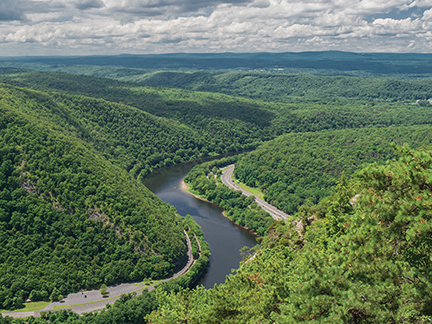By Kevin Sunday

On Feb. 25, 2021, the members of the Delaware River Basin Commission met to vote on a regulation formally banning hydraulic fracturing within the Delaware River Basin. The voting commissioners represent the states of New Jersey, New York, Pennsylvania, Delaware and the federal government. The vote by the federal government (as represented by the U.S. Army Corps of Engineers North Atlantic Division Commander) would perhaps answer the long-standing question: Does President Joe Biden actually want to ban fracking?
After all, during a primary debate, Biden plainly answered in response to a question if fracking would have a role under his administration, “We would make sure it was eliminated.”
In New Hampshire, ahead of the state’s primary, a voter asked Biden if he would stop fracking, and his reply was “yes.”
But once Biden won the nomination, he did what many candidates do — tried to tack back to the center. At a campaign stop in Pittsburgh, the future President announced, “I am not banning fracking. Let me say that again. I am not banning fracking.”
So, with just a month into his presidential administration, the DRBC was holding a vote on banning fracking within the Basin, which covers roughly the eastern third of Pennsylvania. The federal government responded with a resounding . . . abstention. Under the guise that the administration was in its early stages, the U.S. Army Corps said the federal government must take a pass on voting (never minding the fact that on day one, the White House issued a bevy of executive orders, including a range of rollbacks and reviews of Trump administration energy and environmental policies).
But another DRBC voting member wasted no time in supporting the vote, which was unanimous among the states. Pennsylvania Department of Environmental Protection Secretary Pat McDonnell raced to second the motion to vote on the proposal — which, to return to the question of campaign promises, the Wolf administration would later tout as the completion of a 2014 tenet of its gubernatorial campaign platform.
In practice, the formal moratorium extends the de facto moratorium that had been in place for more than a decade, as DRBC dawdled over whether or not to allow drilling in the watershed. At present, any drilling activity would likely be limited to Wayne County — but this discounts the potential for future subsurface development of other shale formations in eastern Pennsylvania as knowledge and technology continue to unfold. More chillingly, the vote allows DRBC to broadly expand what it considers a “project” for the purposes of its regulations.
Historically speaking, DRBC busied itself with water withdrawals and coordinating releases of dammed reservoirs in New York. The Commission was established as a compact among the four states and ratified by Congress in 1961 — years before the U.S. Environmental Protection Agency or many state environmental agencies were formed. The Commission’s compact limits DRBC’s involvement to projects that have a “substantial effect on the water resources of the basin.”
Beyond limiting the expansion of shale development to northeastern Pennsylvania (activities that other interstate water commissions, like the Susquehanna River Basin Commission, have noted have not resulted in impacts to water quality or quantity or flora or fauna), DRBC expanding its ability to ban commercial activity or the reasonable use of private property is extremely chilling. Expansion of agriculture, construction of new energy infrastructure, exploration of subsurface strata for geothermal or carbon capture sequestration, even residential development or the mere operation of fossil-fueled vehicles that contribute to greenhouse gas emissions — is there a limiting principle to DRBC’s expansion of its authority?
It’s a question the federal courts will answer. In October, Pennsylvania landowners who want to lease their land for energy development will present arguments in court over why DRBC overstepped its authority. Separately, state lawmakers led by Senators Gene Yaw, R-Lycoming, and Lisa Baker, R-Lycoming, have filed a lawsuit alleging DRBC has illegally intruded on state government’s ability to manage natural resource developments within our state’s borders.
Unfortunately, this development is indicative of the continuing trend of how much environmental policy is being set in the current era: not as a product of legislative consideration, debate, compromise and votes by elected officials; but by executive action via administrative agencies to ultimately be impeded or blessed by the courts. The economy suffers, but so does the structure of our government.
The PA Chamber will continue to advocate against DRBC’s expansion of power and will continue to work with state and federal lawmakers in support of pro-growth energy policies that provide for economic opportunity for the state’s business community.
Kevin Sunday is director of government affairs for the PA Chamber